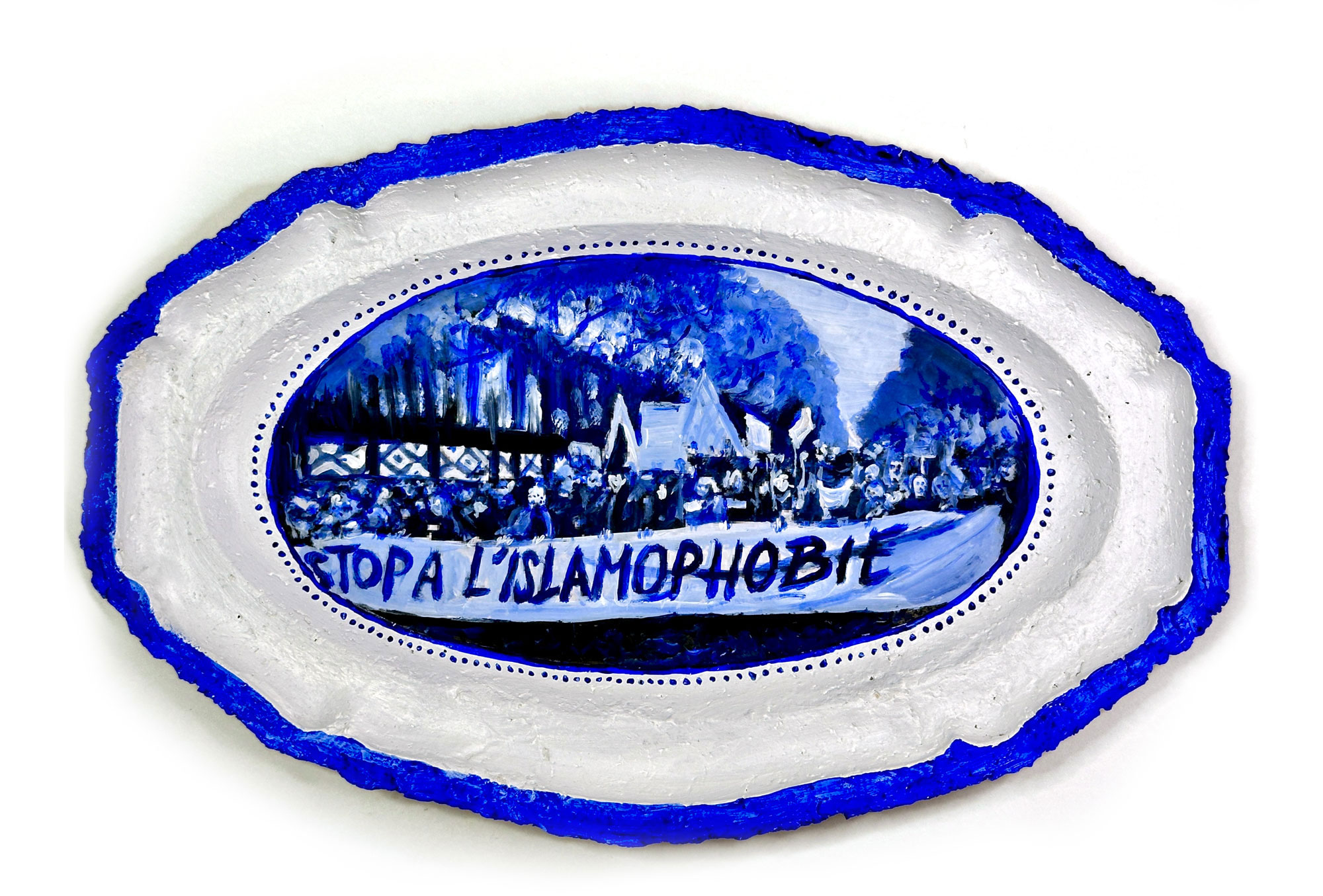Dutch-born, London-based artist Tisna Westerhof offers a new interpretation of Delftware in her series of tiles. The idyllic, romanticised Dutch countryside is replaced by cityscapes of London and raw outlines of industrial powerhouses, such as Battersea Power Station. Children occupy these shadowy scenes by playing in the Thames or precariously hanging off of the London Eye, hereby hinting at the imminent dangers of city life, or, as Westerhof calls it, the ‘flip-side’. These sketches are re-imaginations of old photographs, sometimes stemming from her own childhood or the childhood of her parents and her family. By placing her current British citizenship in the midst of her Dutch heritage and her personal memories, Westerhof poses questions about cultural identity and belonging. Each tile presents a dreamy mix of people, place and culture, laced with darker undertones alluding to the dangers of growing up in a cultural melting pot.

With her series of paper plates, Tisna continues to dissect her heritage and simultaneously reinvent Delftware. Imagery sourced from newspapers has now taken centre- stage; a political protest following the Charlie Hebdo attack, a girl presenting a banner with the message ‘Black Lives Matter’ and an ISIS fighter sporting a weapon and handing out books. Themes of violence and loss are prominent in the representations of police brutality, muslim women mauled by acid attacks and a lone airplane commemorating the lost MH17. Humour, however, can also be found in the satirical glorifications of a fallen war hero, Oscar Pistorius in full flow and a scarcely clad Page 3 girl offering her informed opinion on Thatcher’s alleged decency. In this way, Tisna offers commentary without making a singular statement. The images she uses are not concentrated around a particular issue but are instead re-stagings of what is directly served to us through the media. By placing these images in our minds differently, she poses questions on how they are received and what consequences may follow through their rendering in a more durable format. Yet, much like the news, the paper plates are disposable. Paper plates are there for the party and, once they have fulfilled their function, are cast aside. Tisna thus appeals to the resilience instilled in human nature and rebels by carefully reframing the images that cross her path, hereby infusing them with new life.

Moving away from Delftware to the domestic craft of embroidery, Tisna presents a series of portraits of children. With fabrics sourced from her mother’s extensive collection and newspaper clippings interwoven in the patchwork, the children look the viewer straight in the eye. Although symbolically representing innocence, they have something disconcerting about them. In particular the emotive depiction of a young black girl in a white frilly dress, enwrought with images of police brutality, is far from comforting. However, in conversation, Tisna emphasises the positive message the wall-hangings present; the child also represents the potential for growth and the ability to adapt to one’s environment. By learning through play and experimentation she seeks ‘the child within’ and encourages the viewer to do the same.
At first glance, Tisna’s art exudes an elegance and is aesthetically pleasing in its evident attention to detail. However, on closer inspection, her work transcends its face value. As she states, ‘something beautiful is just not enough’, a stance which is exemplified by her use of irony and her subtle tendency towards activism. Although there is undeniably a political dimension to her work, it is the act of placing the image in a new context that is the drive behind her art. By reinventing both memories from her past and her current diet as provided by the media, Tisna shares her search of trying to make sense of it all. Her Dutch heritage plays an important part in this and acts as her canvas for exploration. Once an exaltation of The Netherlands during its most prolific era and still a symbol of Dutch pride, ‘Delfts Blauw’ is inverted and extended to present Tisna’s impassioned consideration of the world as we see it today.

